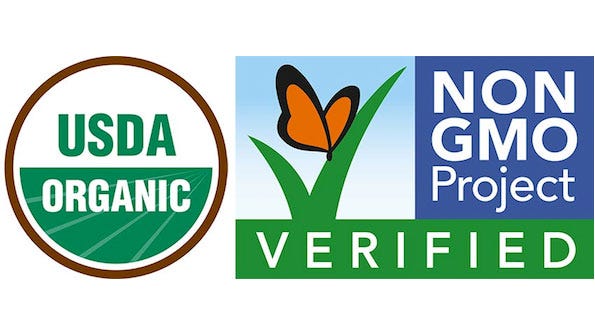Is non-GMO a threat to organic?Is non-GMO a threat to organic?
As the Non-GMO Project logo appears on more and more grocery shelves, some members of the organic food community express concerns that non-GMO will hurt sales of organic foods.
July 9, 2013

 The Non-GMO Project verified seal is appearing on a growing number of food products. Sales of Non-GMO Project verified products increased 66 percent in 2012, topping $2.4 billion in sales—and that doesn’t even include sales of Whole Foods Market’s branded products that are non-GMO verified.
The Non-GMO Project verified seal is appearing on a growing number of food products. Sales of Non-GMO Project verified products increased 66 percent in 2012, topping $2.4 billion in sales—and that doesn’t even include sales of Whole Foods Market’s branded products that are non-GMO verified.
The threat
As the Non-GMO Project logo appears on more and more grocery shelves, some members of the organic food community express concerns that non-GMO will hurt sales of organic foods.
“The non-GMO label threatens the USDA Organic label,” says Greg Lickteig, director, The Scoular Company, which sells organic and non-GMO grains. “Given two products on the grocery store shelf, one being non-GMO and the other organic, the non-GMO product will most certainly be less expensive.”
Rakesh Raniga, president, Indianlife Foods, which sells both organic and Non-GMO Project verified products, agrees. “Non-GMO verified products will be less costly, therefore some consumers may choose them over organic.”
Lynn Clarkson, president of Clarkson Grain, a supplier of organic and non-GMO grains, also sees non-GMO competing with organic. “Yes, I think that a non-GMO label will compete with the USDA organic label for buyers’ food dollars,” he says. “I do not have a sense of how much damage it will do. The best way to avoid GMOs is to buy foods graced with the USDA organic label.”
However, he also says that a non-GMO label could be a stepping stone to more organic demand. “If interest in a non-GMO label sensitizes buyers to the consequences of farmers widely using pesticides and synthetic fertilizers, such development might actually increase demand for certified organic foods.”
The Organic Trade Association hasn’t looked at any possible impact of the Non-GMO Project on organic, says Laura Batcha, executive vice president of the Organic Trade Association. However, she says OTA surveys show increasing awareness and concern about GMOs among organic consumers. “The number of parents that cite avoiding GMOs as a reason to eat organics rose to 22%, up from 17% in 2011,” Batcha says. “We take that as a positive indication that consumers see GMOs as a core reason to purchase organic.”
Compatible with organics
Jim Riddle, coordinator, graduate student organic research grant program at the Ceres Trust and former chair of the National Organic Standards Board, doesn’t see a conflict between non-GMO verified and organic. “Many of those (non-GMO) claims appear on organic products, and they are compatible with organic products and messaging,” he says.
Furthermore Riddle says “Both mandatory GMO labels and voluntary non-GMO labels will force organic producers and marketers to up their game and describe how their production systems have been shown to protect soil health and water quality; prevent pesticide contamination; and build biodiversity better than non-organic systems.”
As Riddle points out, many organic products also feature the Non-GMO Project verified seal. According to Megan Westgate, Non-GMO Project executive director, more than half of the Project’s 9,000 verified products are organic. Also, leading organic food companies such as Eden Foods, Nature’s Path, and Lundberg Family Farms have been strong supporters of the Non-GMO Project since its founding.
Westgate says both labels are needed to help consumers avoid GMOs. “We are committed to helping people understand the respective values of certified organic and Non-GMO Project verified, and we regularly encourage people to seek out both labels as the gold standard,” she says.
Ken Whitman, president of Natural Vitality [and publisher of Organic Connections], which sells organic supplements that are also Non-GMO Project verified, says the non-GMO label is needed. “All food isn’t organic, and in the absence of GMO labeling there needs to be a way shoppers can be assured that the products they are buying are not genetically modified. The Non-GMO Project has filled that need,” he says.
Is there room for both labels?
Several organic industry experts say that educated organic consumers would already know that organic is one of their best options to avoid GMOs since the National Organic Program rules consider genetic engineering an “excluded method.”
“The true organic disciple will understand that ‘organic’ has to be non-GMO,” says Steve Ford, president of Stonebridge, Ltd., a supplier of non-GMO and organic soybeans.
“When it comes to labeling non-GMO products it must be understood that if you’re certitied organic then you’re non-GMO,” says Randal Buresh, president of Oregon’s Wild Harvest. “The Non-GMO Project may help spread the word about organic farming, helping to clarify what being organic is all about.”
Brendan McEntee, president of Cook Natural Products (also not a Non-GMO Project company), agrees. “For the informed organic consumer there will not be any confusion about organic not being non-GMO.” Though he also says “Certain organic products may lose market share to certified non-GMO.”
Bob Sinner, president, SB&B Foods, a supplier of non-GMO and organic grains, sees a place for both non-GMO and organic labeling. “I understand why the organic folks might try to protect their labeling turf, but as a unified effort to support the consumers that reject biotech, I would hope they realize the benefits of both non-GMO and organic labelng,” he says.
Whitman concurs. “I don’t think we need a turf war between organic and non-GMO. It wouldn’t be productive. GMO is unpopular with health-conscious shoppers. Organic is popular. Can’t we just get along?”
You May Also Like



